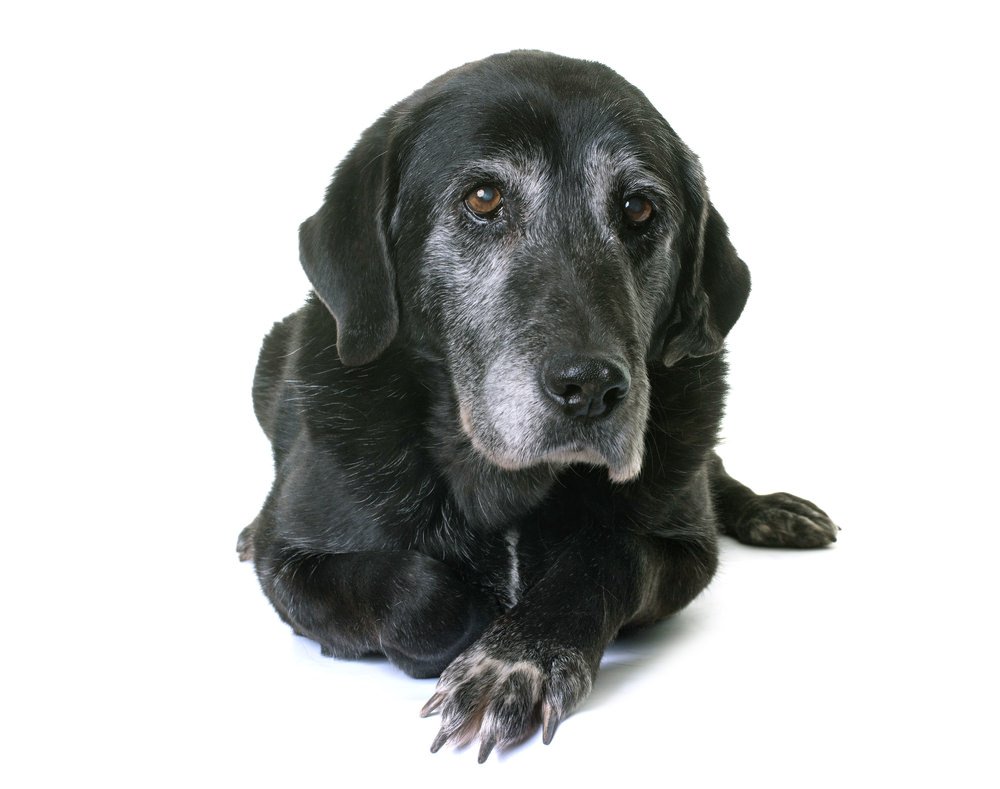Dementia in Dogs | Canine Cognitive Dysfunction
Free Pet Insurance Comparison
Compare Quotes From Top Companies and Save
Secured with SHA-256 Encryption

Dr. Pippa Elliott BVMS, MRCVS
Veterinarian
Dr Pippa Elliott BVMS, MRCVS is a veterinarian with over 30 years of experience in companion animal practice. In 1987 she graduated from the University of Glasgow, with a degree in veterinary medicine and surgery. She works at Blythwood Vets and the People’s Dispensary for Sick Animals (PDSA). Pippa is an advocate of Fear-Free Practice, an animal addict, and a veterinary writer. She is also w...
Veterinarian
UPDATED: Feb 3, 2025
Pet Insurance U receives compensation from the third parties included on this site. This includes payment for clicks from our site to insurance providers’ sites and quote requests generated. Our rankings and reviews are not affected by payments from the insurance companies. The compensation we receive allows the site to be free and regularly updated. Our goal is to review every pet insurance provider, but not all companies are listed on the site.
And many of the companies we review do not pay us anything. We simply rate, compare and review their plan because we feel it will be valuable to you. Our reviews are guaranteed to be unbiased, professional and advertising compensation does not influence rankings.
We are a free online resource for anyone interested in learning more about pet insurance. Our goal is to be an objective, third-party resource for everything pet insurance related. We update our site regularly, and all content is reviewed by pet insurance experts.
UPDATED: Feb 3, 2025
Pet Insurance U receives compensation from the third parties included on this site. This includes payment for clicks from our site to insurance providers’ sites and quote requests generated. Our rankings and reviews are not affected by payments from the insurance companies. The compensation we receive allows the site to be free and regularly updated. Our goal is to review every pet insurance provider, but not all companies are listed on the site.
And many of the companies we review do not pay us anything. We simply rate, compare and review their plan because we feel it will be valuable to you. Our reviews are guaranteed to be unbiased, professional and advertising compensation does not influence rankings.
On This Page
As our dogs age, there are many changes that occur that sneak up on us.
One day our senior dog is fine and then suddenly your dog might act confused or disoriented.
Just like humans, dogs can suffer from dementia.
In dogs, the disease is called Canine Cognitive Dysfunction and it affects many senior dogs.
Symptoms of Dementia in Dogs
Below are just some of the symptoms of dementia in dogs:
- Sleep-wake cycle disturbances
- Generalized anxiety
- Decreased activity levels
- Inappropriate vocalization (howling, barking or whining)
- Repetitive behaviors (pacing)
- Improper elimination
- Fewer social interaction
- Disorientation (or getting “lost” in the house)
If you can recognize the signs early, it can be helpful in treatment and longevity.
The early signs of Canine Cognitive Dysfunction can be subtle and difficult to detect.
They can even be misinterpreted as “just getting old” but it could actually be a larger problem with your senior dog’s health.
However, early recognition and intervention can help.
Be on the lookout for mild versions of the symptoms listed above to be able to act on it in the early stages.
Need Pet Insurance?
FACT: Pet insurance pays up to 90% of vet bills when your pet is sick or injured!
Changes in Hearing or Vision in Senior Dogs

Sensory deficiencies, such as hearing and vision loss, can cause anxiety for dogs. When dogs lose these faculties, they can become disoriented far more easily. Simple things, like failing to hear you calling your dog can make daily life challenging for aging pets and for us too.
But many dogs can be trained to recognize hand signals, and dogs with limited vision can often learn their way around, as long as furniture and other objects remain in the same place.
Enter your ZIP code below to view companies that have cheap pet insurance rates.
Secured with SHA-256 Encryption
Take Your Dog to a Vet for Diagnosis
Your veterinarian will take a behavioral and medical history and conduct a thorough physical and neurological exam.
Many Canine Cognitive Dysfunction symptoms are shared with other serious ailments so it’s important to get the right diagnosis.
For example, a decrease in activity could be a sign of advanced arthritis, inattentiveness could be a result of hearing or vision loss and incontinence could stem from kidney disease.
Once your veterinarian has eliminated other conditions and has made a diagnosis of Canine Cognitive Dysfunction, you and your veterinarian can explore treatment options.
Related: 10 Things You Must Know Before You Buy Pet Insurance
Treatment of Canine Disorientation Dementia
There is a prescribed drug that has shown effectiveness towards improving your dog’s life.
This drug, selegiline or L-deprenyl (brand name Anipryl®) increases the amount of dopamine in your dog’s brain. Dopamine is a chemical substance that transmits nerve impulses in the brain during normal function.
Though it doesn’t work in all dogs, Anipryl may help your dog think more clearly and remember more.
Discuss this with your vet to see it is a good option for your dog and as with all medication, there can be some side effects.
Real Cost Savings from PetFirst Clients

Luna
PetFirst saved his parents
$6,712
A happy energetic Luna one morning couldn’t hold her food down. After months of multiple costly vet visits to specialists and an endoscopy, the problem was discovered and fixed. Luna put 22 pounds back on in no time and her parents were grateful for having PetFirst by their side to pay the bills.
Dietary Supplements for Dogs with Dementia
Vitamins and supplements, such as omega-3 fatty acids and melatonin have been known to improve cognitive function in some dogs.
Talk to your veterinarian to find the right kinds of supplements for your dog. There are also some other homeopathic treatments, herbal remedies, and nutritional supplements said to benefit dogs with cognitive dysfunction.
How To Help Your Dog with Dementia Stay Focused and Happy:
There are many things you can do to improve your dog’s environment, help accommodate him, keep him comfortable and sharpen his mind:
- Develop a daily routine for feeding, exercise, and other activities and keep it consistent.
- Avoid rearranging your furniture or moving your dog’s things. Keep clutter away from walkways and any areas where your dog spends time.
- Make sure your dog gets plenty of exercise. However, know your dog’s limits.
- Teach your dog some fun tricks. Play games like tug-of-war and fetch if he is physically up for it.
- Spend quality time together even just sitting next to each other.
No matter what you are doing with your dog, go slowly and be patient. If your dog becomes frustrated, take a break. Try rewarding him with a treat and helping him get comfortable.
Your dog’s dementia will progress. But with love, tenderness and a combination of the above, you may be able to improve your dog’s quality of life for a longer period of time.
Other articles you may find helpful:
Is Exotic Pet Insurance Necessary?
The Best Pet Insurance By State
Fun Facts, Dog FAQ, And Unsolicited Dog Advice
5 Training Commands to Save Your Dog’s Life
The Ultimate Guide to Safe Foods for Dogs
We get it, your dog is like your child and when your puppy or dog has health problems it is scary. Luckily there is pet insurance companies that will help you pay for any veterinarian care they made need. Checkout the best puppy and dog pet insurance companies and learn about common puppy health issues and ailments in older pets.
Common Health Problems:
Chronic Active Hepatitis in Dogs
Cruciate Ligament Tear in Dogs
Degenerative Myelopathy | Spinal Cord Disease In Dogs
Dementia in Dogs | Canine Cognitive Dysfunction
Dog Comedones (Schnauzer Bumps)
Dog Diarrhea: What Can You Do To Help?
Gallbladder Obstruction in Dogs
Heart Murmurs In Dogs | How To Identify Them
Intervertebral Disc Disease In Dogs
Nasal Solar Dermatitis In Dogs
Progressive Retinal Atrophy In Dogs
The Dog Flu – Symptoms & Treatment for Canine Influenza

Frequently Asked Questions
What does “Secured with SHA-256 Encryption” mean on the website?
This indicates that the website is using SHA-256 encryption to secure the transmission of data. It’s a cryptographic hash function ensuring a secure connection for information exchange.
Who is Melanie Musson, the Published Insurance Expert mentioned on the page?
Melanie Musson is a fourth-generation insurance professional with expertise in state-specific car insurance laws. She shares in-depth knowledge on insurance dynamics and their role in people’s lives, from budgets to coverage levels.
How can I recognize symptoms of dementia in dogs?
Early signs of Canine Cognitive Dysfunction include disorientation, confusion, and changes in behavior. These may be subtle and easily misinterpreted as part of aging. Recognizing these signs early can be crucial for treatment and improving longevity.
Can hearing or vision loss in senior dogs be a sign of dementia?
Yes, sensory deficiencies like hearing and vision loss can contribute to disorientation in senior dogs. Loss of these faculties may cause anxiety, and recognizing hand signals or using other cues can help them navigate their environment.
How is Canine Cognitive Dysfunction diagnosed?
A veterinarian will conduct a behavioral and medical history examination, along with a thorough physical and neurological exam. This is crucial as many symptoms of Canine Cognitive Dysfunction overlap with other serious ailments.
What treatment options are available for Canine Cognitive Dysfunction?
Selegiline (Anipryl®) is a prescribed drug that may improve a dog’s cognitive function by increasing dopamine levels in the brain. Additionally, dietary supplements like omega-3 fatty acids and melatonin could be recommended.
How can I help my dog with dementia stay focused and happy?
Creating a supportive environment, going slow, being patient, and using positive reinforcement can enhance a dog’s quality of life. Additionally, certain vitamins, supplements, and homeopathic treatments may be beneficial.
Is pet insurance necessary, and how can it help with veterinary bills?
Yes, pet insurance can be crucial, covering up to 90% of vet bills when your pet is sick or injured. It provides financial assistance, ensuring your pet receives necessary medical care without putting a strain on your budget.
Who is Dr. Pippa Elliott, the Veterinarian mentioned on the page?
Dr. Pippa Elliott is a veterinarian with over 30 years of experience in companion animal practice. She graduated from the University of Glasgow and is an advocate of Fear-Free Practice, contributing her expertise to veterinary writing.
Is the information on this site unbiased despite receiving compensation?
Yes, the site maintains unbiased and professional reviews. While receiving compensation from third parties, it does not influence rankings, ensuring objective and trustworthy information for users.
Enter your ZIP code below to view companies that have cheap pet insurance rates.
Secured with SHA-256 Encryption
Dr. Pippa Elliott BVMS, MRCVS
Veterinarian
Dr Pippa Elliott BVMS, MRCVS is a veterinarian with over 30 years of experience in companion animal practice. In 1987 she graduated from the University of Glasgow, with a degree in veterinary medicine and surgery. She works at Blythwood Vets and the People’s Dispensary for Sick Animals (PDSA). Pippa is an advocate of Fear-Free Practice, an animal addict, and a veterinary writer. She is also w...
Veterinarian
We are a free online resource for anyone interested in learning more about pet insurance. Our goal is to be an objective, third-party resource for everything pet insurance related. We update our site regularly, and all content is reviewed by pet insurance experts.
